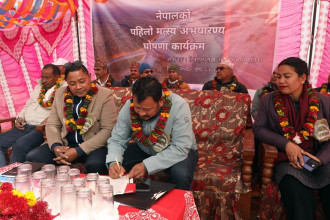-1728206252.jpeg)
KATHMANDU: Stakeholders have emphasised the necessity for provincial and local governments to be financially capable to ensure the success of federalism in Nepal. During a programme titled 'Nepal Federalism Overview: A Fiscal Perspective', organised by the Society of Economic Journalists - Nepal (SEJON) on Friday, participants underscored that advancing federalism is imperative in the current context, and enhancing the financial capacity of provincial and local levels is crucial.
Economist Achyut Wagle highlighted a recurring issue where powers are delegated to provincial and local governments without corresponding capacity-building measures. He mentioned that the federal government often retracts these powers after two years, citing inefficiency. Wagle suggested this trend is intentional and stressed the importance of embedding federalism within the political mindset. He questioned the expertise within political parties, particularly the capability of deputy mayors tasked with budget formulation and judicial committee responsibilities.
-1728206251.jpeg)
Wagle pointed out that local levels frequently fail to adhere to basic budgeting principles. He called for a determined effort to strengthen federalism, emphasising the need for accurate accounting statistics and resource empowerment at the local level. He cited the effective response of local governments during the Covid 19 pandemic as evidence of their potential, advocating for resource and training-focused capacity enhancement.
Yatindra KC, a researcher at Samriddhi Foundation, criticised the ineffectiveness of grants to provincial and local governments. He argued against comparing local levels to the national average, suggesting that comparisons among similar local levels would better highlight strengths and weaknesses. KC also criticised the performance evaluation process, which prioritises budget completion over actual results.
-1728206251.jpeg)
-1728206252.jpeg)
Responding to queries, National Natural Resources and Fiscal Commission (NNRFC) Chairperson Balanand Paudel explained that separate units handle local government development, governance, budget, revenue collection, and service provision. He asserted that the success of federalism depends on the effectiveness of these units. Paudel emphasised that the constitution is based on coordination, cooperation, and co-existence among the three tiers of government. He mentioned that grants are provided to local governments to balance their income with their workload.
Paudel advocated for increasing the equalisation grant and reducing the conditional grant for provincial and local governments, a recommendation also made by the NNRFC. "The local level can plan effectively with resources from the fiscal equalisation grant," he said, arguing that the central government should not use conditional grants to undermine the planning rights of local governments. "Increasing the scope of equalisation grants will also build trust at the provincial and local levels," Paudel added. He highlighted that conditional grants have been increased for local levels, with plans determined centrally, which diminishes the interest of local political leaders.
-1728206252.jpeg)
The NNRFC Chair criticised the government's inability to realistically estimate revenue distribution. "Revenue estimates and reality do not match, which has led to a chaotic budget situation," he said. Paudel praised municipal levels for improvements in internal revenue and said that recurrent expenditure logically increased only after the implementation of federalism.
SEJON Immediate Past President Janardan Baral remarked that although much has been achieved through fiscal federalism, discussions like these are essential to address existing weaknesses.






